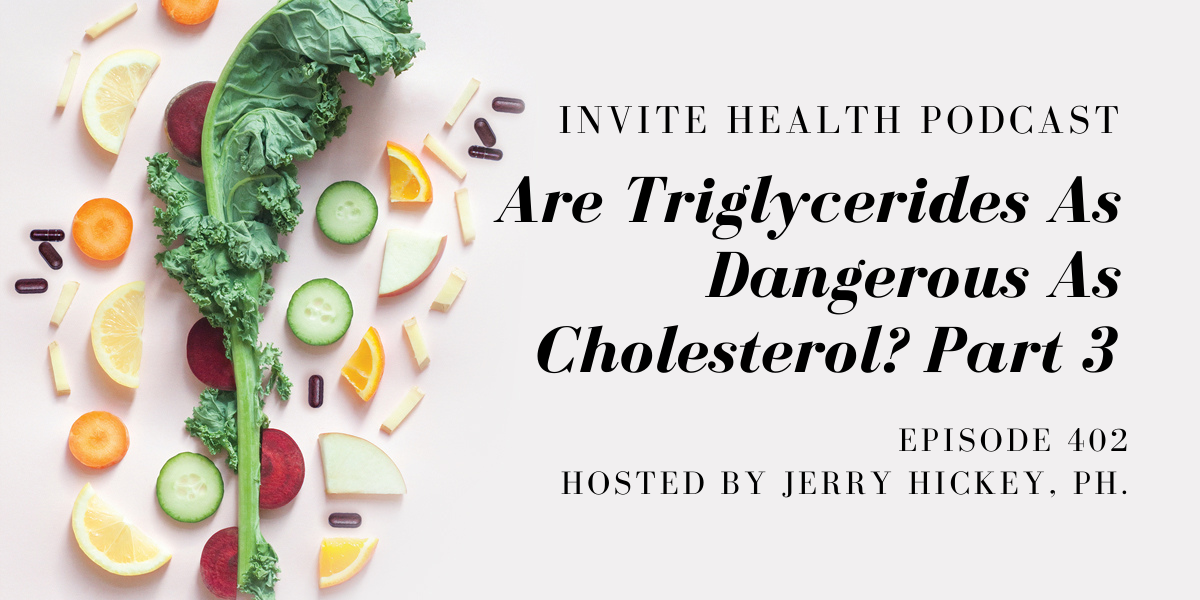Are Triglycerides As Dangerous As Cholesterol? Part 3 – InVite Health Podcast, Episode 402

triglycerides
InViteⓇ Health Podcast, Episode hosted by Jerry Hickey, Ph.
Subscribe Today!
As we discussed in Part 1 and Part 2 of this episode, triglycerides can be exceedingly dangerous when they’re elevated. When they’re somewhat elevated, they can contribute to hardening of the arteries, coronary heart disease and an increased risk of stroke and heart attack. They also cause fatty liver disease and the development of prediabetes or diabetes.†
Natural support for people with elevated triglycerides
There are nutrients that can help fight elevated triglycerides. One of these is niacin, which is a form of Vitamin B3. Vitamin B3 is involved with energy production and can help slow the aging process. Niacin helps to lower your triglycerides, as well as your bad cholesterol, and can also help to raise your good cholesterol a little bit. The problem is that when this is used as a drug, it is used in very high doses and it can be very unpleasant. The amount of niacin that you get in our B-Complex or multivitamins is fantastic, but super high doses of this vitamin may not be great.†
B COMPLEX VITAMINS & YOUR BRAIN, PART 1 – INVITE HEALTH PODCAST, EPISODE 102. Listen Now>>
Psyllium husk can also be beneficial. Psyllium is a type of fiber. It has to be mixed totally with water, otherwise the water in your throat can mix with it and it can swell in your throat. You mix a teaspoon of the psyllium in a glass of water twice a day and take it with food. First of all, it is a fiber and this helps to clean out your colon and support regularity. Psyllium husk also helps to lower your cholesterol, blood sugar and triglycerides.†
Research on fish oils and plant sterols
Then we have plant sterols, which may be my favorite, as well as fish oils.†
A trial done in the United States looked at people who were being treated with statin drugs and also had elevated triglycerides, but low cholesterol levels. These people also had a history of heart disease and diabetes. The researchers gave them 4000mg of fish oil a day, without its natural DHA. Instead, they super concentrated the EPA and changed its molecular shape a little bit. This study found that even if someone had low cholesterol levels, high triglycerides could cause them to have a heart attack or stroke. But, when they gave them the high-potency fish oils for five years, it cut back on the number of people who had a heart attack or stroke. Lowering the triglycerides cut back around an additional 25% in these risks.†
Now let’s discuss krill oil. The EPA and DHA in krill oil are more bioavailable, which means that they’re better absorbed by humans. This is because the oils in fish oils are attached to triglycerides, whereas the oils in krill oil are attached to phosphatides. Phosphatides are very good for the liver, brain, memory and mood. The way that krill oil supplies these fish oils is also excellent for helping to lower cholesterol and triglycerides.†
There is another kind of fat called sterols which are very interesting. They block the absorption of cholesterol from food in your digestive tract. Studies over the past 50 years show that they can help lower the risk of developing heart disease, as well as cholesterol levels. More recent studies are showing that they also help to lower triglycerides.†
In this episode, Jerry Hickey, Ph. concludes his discussion on triglycerides. He offers suggestions for nutrients and supplements that can help people with high triglyceride levels and cites multiple studies.†
Key Topics:
- Many issues associated with elevated triglycerides
- Impacts of niacin on the body
- Different types of essential fatty acids
- Research on krill oils
Thank you for tuning in to the InViteⓇ Health Podcast. You can find all of our episodes for free wherever you listen to podcasts or by visiting www.invitehealth.com/podcast. Make sure you subscribe and leave us a review! Follow us on Facebook, Twitter and Instagram at InViteⓇ Health today. We’ll see you next time on another episode of the InViteⓇ Health Podcast.


